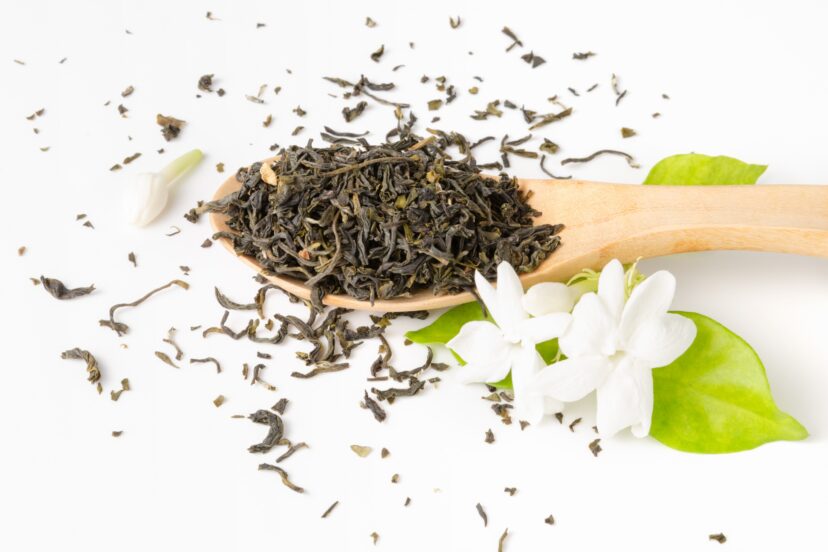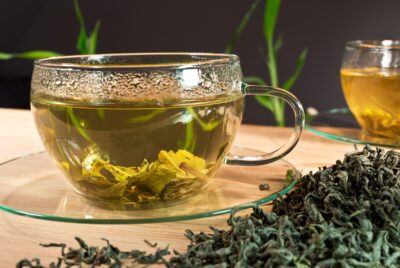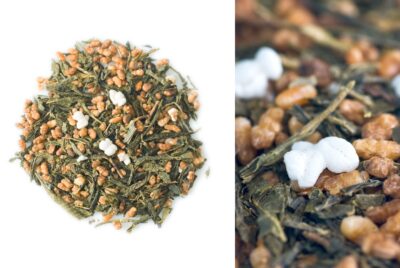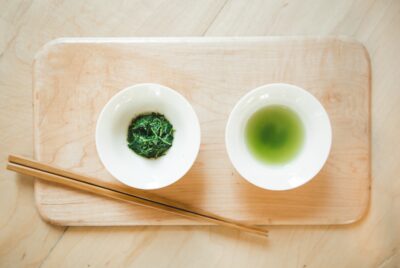Jasmine Green Tea: A Comprehensive Guide
Jasmine green tea is a delightful blend that combines the subtle, soothing flavor of green tea with the aromatic and floral notes of jasmine flowers. This tea not only offers a refreshing taste but also provides numerous health benefits, making it a popular choice among tea enthusiasts. In this guide, we’ll explore everything you need to know, from its history and health benefits to brewing tips and varieties.
Health Benefits of Jasmine Green Tea
Rich in Antioxidants
One of the primary health benefits is its high antioxidant content. Antioxidants, such as catechins found in green tea, help protect your cells from damage caused by free radicals. This protection can reduce the risk of chronic diseases and support overall health.
Boosts Metabolism and Aids Weight Loss
This tea is known to boost metabolism, making it an excellent addition to a weight loss regimen. The catechins enhance fat oxidation and improve the efficiency of your body’s ability to burn calories. Regular consumption can support your weight loss efforts and help maintain a healthy weight.
Reduces Stress and Enhances Mood
The calming aroma of jasmine flowers is not just pleasant but also therapeutic. Jasmine green tea has been found to reduce stress levels and improve mood. The scent of jasmine can promote relaxation, making it an excellent choice for unwinding after a long day.
Supports Heart Health
Regular consumption can improve cardiovascular health. The antioxidants and polyphenols in the tea help reduce cholesterol levels, improve blood circulation, and lower blood pressure. These benefits contribute to a healthier heart and reduce the risk of heart disease.
Boosts Immune System
Jasmine green tea contains various compounds that can strengthen the immune system. The antioxidants, vitamins, and minerals found in the tea help boost your body’s defense mechanisms, making you less susceptible to common illnesses like colds and flu.
Improves Digestive Health
Drinking jasmine green tea can aid digestion and alleviate gastrointestinal discomfort. The catechins and other compounds in the tea can help soothe the stomach, reduce bloating, and improve overall digestive health.
Anti-Aging Properties
The antioxidants can also have anti-aging effects. They help fight free radicals that cause skin aging and damage. Regular consumption can promote healthy, youthful skin and reduce the appearance of fine lines and wrinkles.
Enhances Cognitive Function
Jasmine green tea can improve brain function and cognitive performance. The caffeine and L-theanine found in green tea work together to enhance brain activity, improve focus, and increase alertness. This combination also supports long-term brain health and reduces the risk of neurodegenerative diseases.
Reduces the Risk of Cancer
Some studies suggest that the antioxidants in jasmine green tea may help reduce the risk of certain types of cancer. The polyphenols in green tea have been shown to inhibit the growth of cancer cells and reduce tumor development.
Promotes Oral Health
Jasmine green tea contains catechins that can improve oral health by inhibiting the growth of bacteria that cause cavities and bad breath. Regular consumption can also reduce the risk of gum disease and improve overall dental hygiene.
How to Brew the Perfect Cup of Jasmine Green Tea
Selecting Quality Leaves
To brew the perfect cup, start by selecting high-quality tea leaves. Look for leaves that are whole and fragrant, as these will provide the best flavor. Avoid using tea bags, as they often contain lower-quality tea dust.
Water Temperature and Steeping Time
Brewing requires attention to detail. Use water that is around 175°F (80°C) to avoid burning the delicate leaves. Steep the tea for 2-3 minutes to extract the optimal flavor without bitterness. Experiment with the steeping time to find your perfect balance.
Flavor Enhancements
While jasmine green tea is delightful on its own, you can enhance its flavor with a few simple additives. A squeeze of lemon or a teaspoon of honey can complement the floral notes. Mint leaves or a slice of ginger can also add a refreshing twist to your cup.
Different Varieties of Jasmine Green Tea
1. Traditional Jasmine Green Tea
Traditional jasmine green tea is made by layering jasmine flowers with green tea leaves, allowing the scent to infuse the tea. This process is repeated several times to ensure a rich, aromatic flavor. The result is a delicate balance of green tea and jasmine.
2. Jasmine Pearls
Jasmine pearls are a premium variety of jasmine green tea. The leaves are hand-rolled into small pearls and scented with jasmine flowers. As the pearls unfurl during brewing, they release a concentrated and exquisite flavor. This variety is often considered the highest quality of jasmine green tea.
3. Jasmine Silver Needle
Jasmine silver needle is another high-quality variety, made from the young buds of the tea plant. These buds are scented with jasmine flowers, creating a light and subtle flavor. Jasmine silver needle tea is prized for its smooth, delicate taste and fragrant aroma.
4. Jasmine Dragon Phoenix Pearls
Jasmine Dragon Phoenix Pearls is a luxurious variety of jasmine green tea. The young leaves and buds are hand-rolled into pearls and then scented with fresh jasmine blossoms multiple times. This creates a highly fragrant and smooth tea with a lingering floral taste.
5. Jasmine Green Monkey
Jasmine Green Monkey is a rare variety that combines high-quality green tea leaves with the delicate scent of jasmine flowers. The tea leaves are slightly twisted and offer a rich, full-bodied flavor with a hint of sweetness and a floral finish.
6. Organic Jasmine Green Tea
Organic jasmine green tea is made from leaves grown without synthetic pesticides or fertilizers. This variety is ideal for those who prefer a more natural and environmentally friendly option. The flavor is clean and pure, allowing the natural sweetness of jasmine to shine through.
7. Jasmine Green Tea Powder
The powder is made by finely grinding high-quality jasmine green tea leaves. This powder can be used to make traditional tea or as an ingredient in smoothies, desserts, and other recipes. It offers a concentrated flavor and the full benefits of the tea leaves.
8. Jasmine Sencha
Jasmine Sencha is a combination of Japanese Sencha green tea and jasmine flowers. This blend provides a unique flavor profile with the grassy notes of Sencha balanced by the sweet, floral aroma of jasmine. It’s a refreshing and invigorating tea that can be enjoyed hot or cold.
9. Jasmine Mao Feng
This is a high-grade green tea that is scented with jasmine flowers. The tea leaves are carefully handpicked, and the jasmine flowers are layered over the tea to naturally infuse the fragrance. This variety is known for its slightly sweet taste, smooth texture, and delicate floral aroma. The Mao Feng tea leaves are typically larger and more robust, providing a unique flavor profile that is both rich and refreshing.
10. Jasmine Bi Luo Chun
This is a rare and sought-after variety of jasmine green tea. Bi Luo Chun, which translates to “Green Snail Spring,” refers to the tightly curled leaves that resemble snail shells. When infused with jasmine, this tea offers a complex flavor with fruity and floral notes, along with a smooth, lingering finish. The jasmine scenting process enhances the tea’s natural sweetness, making it a delightful choice for those who enjoy intricate flavors.
History and Origin of Jasmine Green Tea
Origins in China
The story of jasmine green tea begins in ancient China, where jasmine flowers were first introduced from Persia during the Han Dynasty. The Chinese quickly discovered that blending these fragrant flowers with green tea produced a unique and delightful beverage. This practice became particularly popular during the Song Dynasty, when tea culture flourished in China.
Evolution and Spread Worldwide
Over the centuries, the popularity of jasmine green tea spread beyond China, reaching tea drinkers around the world. Its unique combination of delicate green tea and fragrant jasmine flowers made it a sought-after export. Today, it is enjoyed globally, celebrated for its taste and health benefits.
How Jasmine Green Tea is Made
Harvesting the Green Tea Leaves
The process begins with the careful harvesting of green tea leaves. These leaves are typically picked in the early spring when they are young and tender. The timing of the harvest is crucial, as the leaves must be of the highest quality to ensure the best flavor and aroma. Once harvested, the leaves are immediately steamed or pan-fired to halt oxidation, which preserves their vibrant green color and fresh, vegetal taste.
The Jasmine Scenting Process
The key to jasmine green tea’s distinctive flavor lies in the scenting process, which takes place during the summer when jasmine flowers are at their most fragrant. Jasmine blossoms are picked early in the morning, while still closed, and kept cool until evening. As night falls, the flowers open, releasing their sweet aroma. The green tea leaves are then layered with the freshly opened jasmine flowers in a process known as “scenting.” The tea leaves naturally absorb the fragrance of the jasmine blossoms, creating the signature aroma and flavor of jasmine green tea.
Multiple Scenting Cycles
To achieve a strong jasmine flavor, the scenting process may be repeated multiple times. High-quality jasmine green teas are often scented five to seven times, with fresh jasmine flowers added at each stage. This meticulous process ensures that the tea absorbs the maximum amount of fragrance, resulting in a richly aromatic final product.
Final Drying and Rolling
After the scenting process is complete, the tea leaves are re-fired to remove any moisture absorbed during scenting. This step is crucial to ensure the tea remains dry and retains its quality during storage. In some cases, the tea leaves are hand-rolled into pearls or other shapes before the final drying, such as in the production of Jasmine Pearls. This additional step helps concentrate the flavor, providing a more intense jasmine experience when brewed.
A Tradition of Excellence
The entire process of making jasmine green tea requires skill, patience, and attention to detail. From the careful selection of tea leaves to the precise timing of the scenting process, every step is essential to creating the perfect balance of green tea and jasmine aroma. This traditional method has been passed down through generations, ensuring that each cup offers a timeless and exquisite experience.
Does Jasmine Green Tea Have Caffeine?
- The amount of caffeine is generally lower than that in black tea or coffee.
- A typical cup contains about 20-30 milligrams of caffeine, compared to 95 milligrams in a cup of coffee. This makes it a good option for those who want a mild energy boost without the jitters associated with higher caffeine intake.
- Additionally, jasmine green tea also contains L-theanine, an amino acid that promotes relaxation and counteracts some of the stimulating effects of caffeine, providing a balanced and calming experience.
Safety and Side Effects of Jasmine Green Tea
Caffeine Sensitivity
While jasmine green tea contains less caffeine than coffee or black tea, it can still affect individuals who are sensitive to caffeine. Symptoms of caffeine sensitivity may include insomnia, jitteriness, increased heart rate, and anxiety. If you are sensitive to caffeine, consider limiting your intake or opting for a decaffeinated version.
Gastrointestinal Issues
Some people may experience stomach discomfort or digestive issues when consuming jasmine green tea, especially on an empty stomach. The tannins in green tea can increase stomach acid, leading to nausea or stomach upset. To avoid this, try drinking it after meals or with a snack.
Allergic Reactions
Although rare, some individuals may be allergic to jasmine flowers or green tea. Symptoms of an allergic reaction can include hives, itching, swelling, or difficulty breathing. If you experience any of these symptoms, discontinue use and consult a healthcare provider.
Interference with Medications
Green tea, including jasmine green tea, can interfere with certain medications. For example, it may reduce the effectiveness of beta-blockers and certain blood-thinning medications. If you are taking prescription medications, it’s best to consult with your healthcare provider before adding it to your diet.
Iron Absorption
The tannins in green tea can inhibit the absorption of non-heme iron (the type of iron found in plant-based foods). If you have an iron deficiency or are at risk for anemia, consider drinking it between meals rather than with meals to minimize its impact on iron absorption.
Pregnancy and Breastfeeding
While moderate consumption is generally considered safe during pregnancy and breastfeeding, it’s important to be mindful of caffeine intake. Excessive caffeine can lead to complications such as increased risk of miscarriage or low birth weight. Consult with your healthcare provider to determine a safe amount for you.
Choosing the Best Jasmine Green Tea
Choosing the best jasmine green tea involves considering factors like quality, origin, and personal preference. Here are some tips to help you make an informed choice:
Look for Whole Leaves: High-quality jasmine green tea typically consists of whole, unbroken leaves. Whole leaves retain more of their natural oils and flavors compared to broken leaves or tea dust found in lower-quality teas.
Check for Freshness: Freshness is key to a flavorful cup of tea. Look for tea that has been harvested and processed recently. Many reputable tea sellers will provide information about the harvest date.
Consider the Scenting Process: The best jasmine green teas are scented naturally by layering leaves with fresh jasmine flowers. This process can be repeated several times to enhance the floral aroma. Avoid teas that use artificial flavorings or additives.
Research the Origin: Some of the finest jasmine green teas come from specific regions in China, such as Fujian Province. These regions have a long history of producing high-quality jasmine tea.
Read Reviews: Customer reviews can provide valuable insights into the quality and flavor of different jasmine green teas. Look for reviews from other tea enthusiasts to guide your decision.
Try Different Varieties: Jasmine green tea comes in various forms, such as pearls, silver needle, and traditional loose leaf. Experiment with different varieties to find the one that best suits your taste preferences.
Tips for Enjoying Jasmine Green Tea
Experiment with Blends
One of the joys of this tea is its versatility. Experiment with blending it with other teas or herbs to create unique flavors. Try mixing it with white tea for a lighter taste or with black tea for a more robust cup. The possibilities are endless.
Incorporate into Recipes
Jasmine green tea can also be a fantastic ingredient in cooking and baking. Use it to infuse flavor into desserts, like jasmine tea-infused ice cream or cookies. It can also be used to flavor rice or as a base for a refreshing tea cocktail. Get creative and enjoy the unique taste in various dishes.
Cold Brew for a Refreshing Twist
For a refreshing summer beverage, try cold brewing the tea. Simply add loose tea leaves to cold water and let it steep in the refrigerator for 6-8 hours. This method produces a smooth, less bitter tea that’s perfect for hot days.
Pairing with Food
Jasmine green tea pairs wonderfully with a variety of foods. Its floral notes complement light dishes like salads, seafood, and chicken. It also works well with sweet treats like pastries and fruit. Experiment with different pairings to find your favorites.
Using Jasmine Green Tea in Beauty Treatments
The antioxidants and soothing properties of jasmine green tea make it a great addition to your beauty routine. Use cooled tea as a facial toner to refresh your skin or add it to your bath for a relaxing soak. You can also make a hair rinse to add shine and reduce dandruff.
Making Jasmine Green Tea Smoothies
Blend with fruits and yogurt to create a healthy, delicious smoothie. This is a great way to enjoy the benefits of jasmine green tea while adding a burst of flavor and nutrients to your diet.
Jasmine Green Tea Lattes
For a cozy, comforting drink, try making a latte. Steep strong jasmine green tea and mix it with steamed milk and a touch of honey. This creamy beverage is perfect for relaxing evenings or a special treat.
Add Spices for a Flavor Boost
Enhance the flavor of your jasmine green tea by adding spices such as cinnamon, cardamom, or cloves. These spices can add warmth and complexity to the tea, making it even more enjoyable.
Sweeten with Natural Sweeteners
If you prefer your tea sweet, use natural sweeteners like honey, agave syrup, or stevia. These options are healthier than refined sugar and can enhance the floral notes of jasmine green tea.
Create Iced Jasmine Green Tea Cubes
Make iced cubes by freezing brewed tea in ice cube trays. These cubes can be added to iced tea or other beverages to keep them cool without diluting the flavor.
Use Jasmine Green Tea in Marinades
Incorporate into marinades for meats and vegetables. The tea adds a subtle, aromatic flavor that complements a variety of dishes. Brew a strong cup of jasmine green tea and use it as a base for your marinade.
Infuse Jasmine Green Tea into Sauces
Add brewed jasmine green tea to sauces for an extra layer of flavor. It works particularly well in Asian-inspired sauces and dressings, adding a delicate floral note that enhances the overall taste.
Final Thoughts
Jasmine green tea is more than just a beverage; it’s a sensory journey that combines the delicate flavors of green tea with the intoxicating aroma of jasmine flowers. Whether you’re sipping it for its numerous health benefits, such as improved heart health and stress reduction, or simply enjoying the calming ritual of brewing a perfect cup, jasmine green tea offers a unique experience. With a variety of options, from traditional loose-leaf to rare specialties like Jasmine Bi Luo Chun, there’s a jasmine green tea to suit every palate. Explore, experiment, and find the jasmine green tea that resonates with you, turning each cup into a moment of serenity and delight.
FAQs
What is the best time of day to drink jasmine green tea?
It can be enjoyed at any time of day. However, many people find it particularly refreshing in the morning or as a relaxing beverage in the evening.
Can I drink jasmine green tea if I’m sensitive to caffeine?
Yes, it contains less caffeine than coffee or black tea, making it a good option for those sensitive to caffeine. You can also opt for a decaffeinated version if needed.
How many cups of jasmine green tea should I drink daily for health benefits?
Most studies suggest drinking 2-3 cups daily to enjoy its health benefits. However, listen to your body and adjust your intake based on your personal tolerance and preferences.
Is jasmine green tea safe during pregnancy?
While it is generally safe, it’s best to consult with your healthcare provider before consuming during pregnancy, especially if you have any concerns about caffeine intake.
Can I reuse jasmine green tea leaves?
Yes, the high-quality leaves can often be steeped multiple times. The flavor may become more subtle with each infusion, but it can still be enjoyable.




